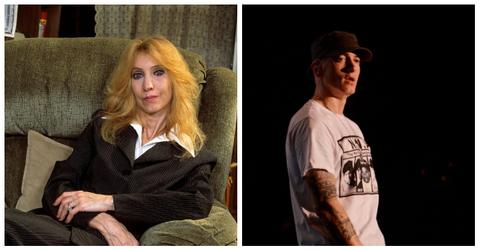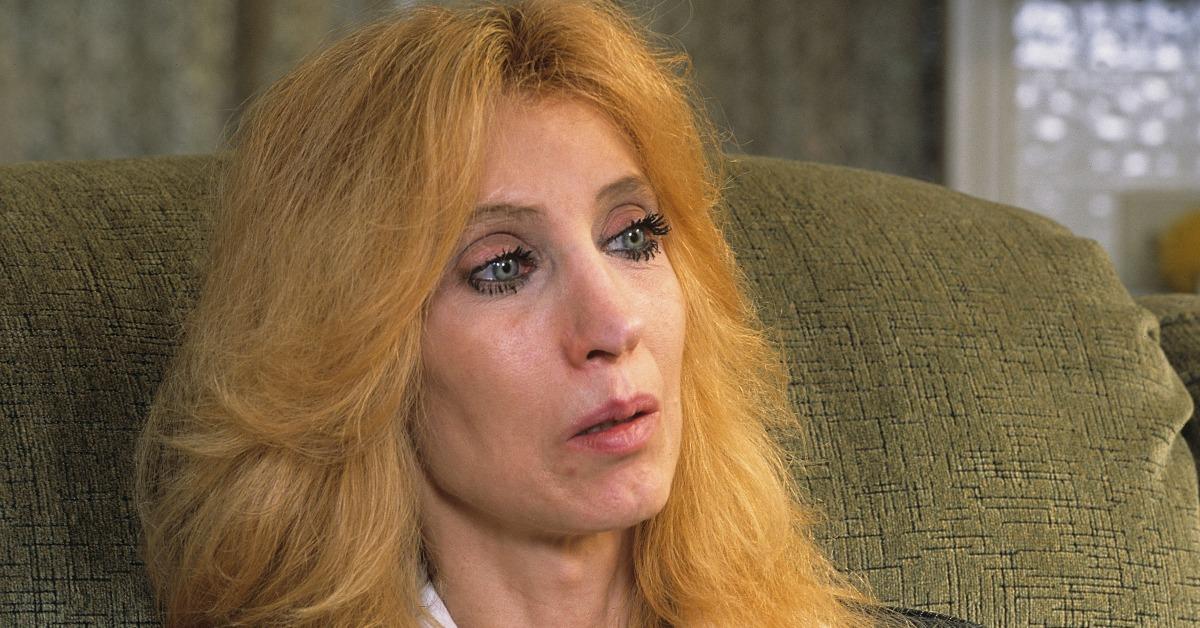Eminem and His Late Mother Debbie Nelson Had a Complicated, Turbulent Relationship
Eminem rapped about killing his mom, but before her passing he shared a different perspective.
Published Dec. 3 2024, 1:50 p.m. ET

For fans of Marshall "Eminem" Mathers, it's no secret that the rapper had an extraordinarily complicated relationship with his mother, Debbie Nelson. Some of his songs excoriate her, while others suggest that he has spent some time reflecting and forgiving.
In October 2024, Eminem received the joyous news that his older daughter Hailie was expecting a baby, making the legendary rapper a grandfather. But his mother won't be around to meet her great-grandchild, because she passed away in December 2024 at the age of 69. Here's a look back at their complicated relationship and where things stood in the years before her death.

Eminem and his mom Debbie had a very complicated relationship.
Eminem's mother Debbie married his father Bruce Mathers when she was 15 years old, and he was 22. A few years later, in 1972, they welcomed son Marshall, later nicknamed Eminem for his double-M moniker. However, not long after Eminem's birth, Bruce left the family. Debbie was forced to raise Eminem and his half-brother Nathan, whom he refers to as Nate, alone. They moved frequently when the boys were young, eventually famously settling in Detroit near 8-Mile Road.
Debbie has always maintained that she did her best for her sons and supported Eminem. Eminem's story is a little different. He has accused her of stealing his paychecks, doing drugs, and neglecting him and his little brother, who was taken by the state when he was 8, according to Eminem.
As his rap career took off, Eminem's lyrics often took aim directly at his mother.
In the video for "Cleaning out My Closet," for instance, Eminem uses imagery to suggest striking back at his mom, with actors portraying a younger Marshall and Debbie. "Debbie" pops prescription pills and drags "Marshall" by the ears. In the song, Eminem accuses his mom of suffering from Munchausen syndrome by proxy and making Eminem believe he was sick when he was younger.
Near the end, he raps, "See, what hurts me the most is you won't admit you was wrong. B---h, do your song, keep tellin' yourself that you was a mom!"
From lyrics of scorn and violence to lyrics of amends, Eminem's songs hint at their story.
In another song, "My Name Is," Eminem raps, "I just found out my mom does more dope than I do." Debbie filed a $10 million lawsuit against her son for that line, but only ultimately received $25,000.
Over the years, Eminem's rage at both his father for abandoning him and his mother's alleged substance abuse issues featured prominently in his songs.
As his oldest daughter Hailie grew, Eminem often compared his parents' behavior with his own, expressing disbelief that they could treat him and his younger brother the way they did with his father's abandonment and the abuse he says his mother heaped on the two of them.
But before the end, Eminem eventually had a change of heart. In 2013, Eminem released a collaborative song with FUN. lead singer Nate Reuss called "Headlights," and the song dove deeply into Eminem's feelings of regret and forgiveness.
In "Headlights," a remorseful and older Eminem gives his mom credit for doing her best. He acknowledged the turbulence and abuse in his childhood home but had some softer words for his once-maligned mother.
He rapped, "I went in headfirst, never thinkin' about who, what I said hurt / In what verse, my mom probably got it the worst / The brunt of it, but as stubborn as we are, did I take it too far? 'Cleanin' out My Closet' and all them other songs."
The song continues, "But regardless, I don't hate you 'cause, Ma. You're still beautiful to me, 'cause you're my Ma."
The chorus, sung by Nate, adds, "I guess we are who we are. Headlights shining in the dark night, I drive on. Maybe we took this too far."
Although Eminem clearly explains that he felt like he had too much responsibility, he muses that he and his mom should have been brought closer by the feeling of betrayal that Bruce left, although it drove them apart instead.
"Headlights" was written 11 years before Debbie's passing, and it was a mea culpa and love note as Eminem expressed regret for writing his earlier, violent songs such as "Cleaning out My Closet."
While it's unclear what their relationship was exactly at her time of death, things had been mostly quiet in the public sphere between the two of them since "Headlights" was released.